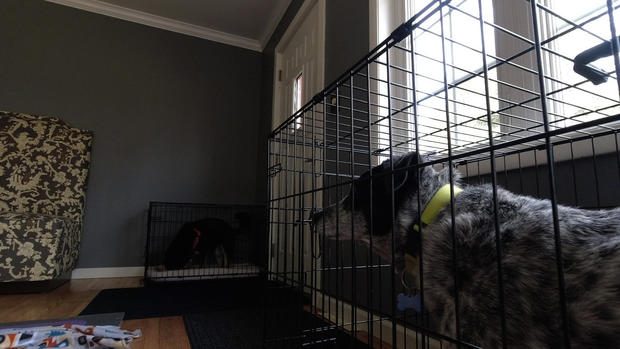How Can We Help Pets With Separation Anxiety?
MINNEAPOLIS (WCCO) -- As we head back to work and school, our left-behind pets wonder why they're suddenly so alone. And that can lead to anxious, even destructive behavior.
So how can we help pets with separation anxiety? Good Question.
Jeff Wagner learned it's a process that should start well before owners transition away from home.
Like so many, Kim Thompson of Eagan unfortunately lost her job in 2020. It suddenly created more time to spend with her dog Cydney.
But last month, Thompson got back in the work force and Cydney isn't handling it well. It started with a fan cable.
"Completely chewed the cord in half. [Cyndey] tipped over the garbage can trying to get to the window to get to the blinds, so I had to buy new blinds because she destroyed some blinds," Thompson said. "I was like we need to do something because this is getting out of hand."
Addressing these problems is Liv Hagen's specialty as the head behaviorist at the Animal Humane Society.
How can you tell if your dog is feeling that anxiety?
"Actually watch your dog and their behavior when you're gone," said Hagen, who uses inexpensive surveillance cameras in her home to monitor her dogs. "Are they drooling, barking, whining, heavy panting? Are they actually engaging in destructive behaviors like trying to break out of their crate, or digging up carpet or pulling things off the counter?"
To avoid those symptoms, Hagen said training your dog to be alone shouldn't wait until you've already transitioned back to the workplace.
"It's a couple weeks or even ideally a couple months prior to when you know that's going to happen," she said.
She suggests starting with leaving pets alone for short stints, such as going to the grocery store or for a walk on your own, training your pet to go into their crate or personal room at that time. Hagen uses a food filled Kong toy as help to keep them happily distracted.
How do you address separation anxiety if you've already transitioned away from home?
"Any kind of routine can reduce stress and anxiety for any animal," Hagen said.
That could include going for a walk or playing with your pet to expel its energy before you leave, then lead them to their crate or room.
Thompson says her veterinarian suggested that idea to calm Cydney down.
"It hasn't fully worked yet," said Thompson.
There are also methods to try once you return home from work or school. Pets are often excited when you walk back through the door and owners often share in that excitement. Hagen said acting differently upon your return could temper anxiety.
"Some people find it helpful when they get home, they kind of let their pet calm down before they give them any attention at all. So really be aware of your actions and how your actions might actually be exacerbating your pet's anxiety," she said.
If problems persist, it could be time to try over the counter or prescription medication for the dog. But Hagen advises pet owners call their veterinarian first to make sure the pet doesn't have underlying medical conditions.
"They're gonna be the best resource to be able to guide you on what's really going to be helpful and appropriate for your animal," she said.
Thompson has gone the medication route as well and might deploy another tactic.
"We actually are thinking ... about hiring a dog walker to break up the day," said Thompson.
The Animal Humane Society has a behavior help line you can call to get more advice for separation anxiety. The number is 952-HELP-PET or 952-435-7738.




